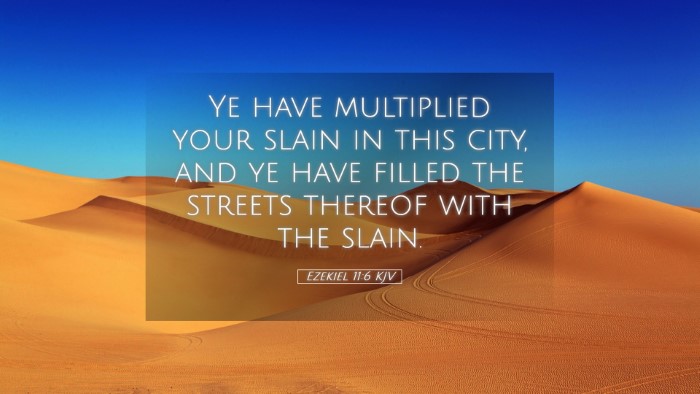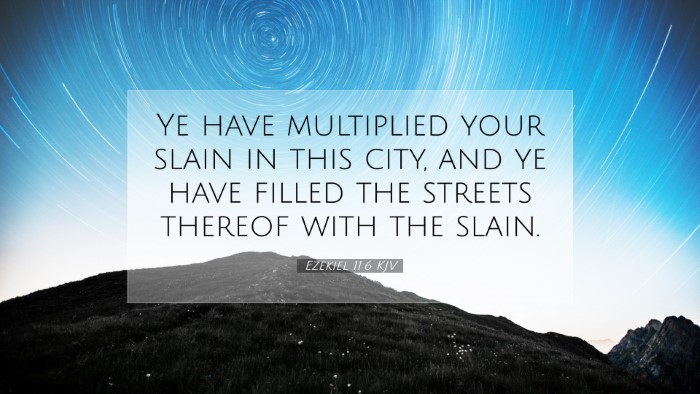Ezekiel 11:6 Commentary
Bible Verse: "Ye have multiplied your slain in this city, and ye have filled the streets thereof with the slain." (Ezekiel 11:6)
Introduction
The verse Ezekiel 11:6 presents a vivid illustration of the moral and spiritual decline of Jerusalem during the time of the prophet. Ezekiel, a priest and prophet, was called to prophesy to the exiled Israelites in Babylon, confronting them with their sins and calling them back to faithfulness to God. This commentary draws from the insights of notable public domain theologians to elaborate on the implications and meanings embedded in this crucial statement.
Contextual Background
The book of Ezekiel is deeply rooted in the context of the Babylonian exile. The people of Israel had strayed from God's commandments, and the prophet was tasked with revealing the consequences of their actions. This verse belongs to a section where God depicts the violence, corruption, and injustices that characterized the city of Jerusalem.
Interpretation of the Verse
-
Matthew Henry:
Henry emphasizes the wickedness of the people, noting that the "slain" refers not only to physical deaths but also to the spiritual death that comes from continued rebellion against God. He highlights the fact that the streets of Jerusalem were laden with injustice, illustrating a city rife with sin. The multiplication of slain denotes the ongoing and escalated violence that permeated the city, as life was cheapened in light of their disobedience.
-
Albert Barnes:
Barnes provides an analytical perspective, interpreting the “slain” as a metaphor for the destruction of both the body and soul. He points out that the violence stemmed from the leaders and influential individuals of the city who led the people astray. The reference to "filled the streets" indicates a public and unrestrained display of violence. Barnes suggests that this serves as a divine indictment against the prevailing practices and the bloodshed that characterized the society.
-
Adam Clarke:
Clarke further elucidates the spiritual implications of the verse. He suggests that the metaphor of "multiplied slain" extends beyond the physical realm into the spiritual realm, where disobedience has led to a separation from God. Clarke argues that the imagery of filled streets signifies both divine judgment and an indictment of leadership, focusing on the need for repentance and reconciliation with God to restore the city's integrity.
Theological Themes
This verse articulates several key theological themes relevant for pastors, theologians, and scholars:
-
The Nature of Sin:
The passage highlights the gravity of sin, not only in societal terms but also in how it alienates individuals from God. The accumulation of slain represents the weight of transgressions leading to a breakdown of societal norms and divine relationship.
-
Judgment and Accountability:
Ezekiel's pronouncement serves as a reminder of God's righteous judgment. The streets filled with the slain are emblematic of the consequences that nations and individuals face when they turn away from divine statutes.
-
Call to Repentance:
Implicit in this call-out is the urgent necessity for the people to repent. It challenges contemporary readers to evaluate how societal violence and injustices persist in current contexts, emphasizing the dire need for godly behavior and repentance to see restoration.
Application for Today
The timeless relevance of Ezekiel 11:6 speaks profoundly to current personal and societal issues:
-
Christian Responsibility:
Believers are called to be vigilant against the societal vices that lead to the spiritual “slain.” It is a reminder of our role in being the salt and light of the world, influencing culture positively and resisting the pressures of violence and moral decay.
-
Spiritual Vigilance:
This verse warns against complacency in faith and a lack of discernment regarding the influences of the surrounding culture. It calls for proactive engagement in prayer, advocacy for justice, and speaking out against sin in all its forms.
-
Hope in Restoration:
Despite the dark imagery of slain in the streets, there is an underlying hope for restoration through repentance and turning back to God. This encourages a view of divine grace and mercy that can heal even the most broken situations.
Conclusion
Ezekiel 11:6 stands as a powerful message about the consequences of sin and the moral state of society. By exploring this passage through the lenses of theologians like Matthew Henry, Albert Barnes, and Adam Clarke, we gain deeper insights into not only the historical context of Jerusalem but also the urgencies of faithfulness to God in our contemporary world. Let this passage encourage believers to reflect on personal and collective actions that align with divine will and foster a spirit of reconciliation and justice.


